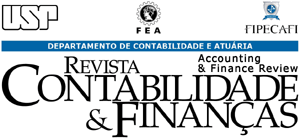Editorial
Issue 58 comes with a highly relevant change: papers will be published in Portuguese and English at the same time. This change, which the editorial board approved in 2011, as announced in the previous edition, is relevant for the internationalization process of Brazilian accounting, enhancing Brazilian researchers' conditions to be known in other contexts. In addition, it will increase the opportunity for researchers from other countries to publish in Brazil.
This change comes at a moment when the Brazilian Federal Agency for Support and Evaluation of Graduate Education promoted RC&F to QUALIS level A2, which indicates the perception of past contributions and future potential. Our ackno- wledgements for the work of past editors who took care of RC&F and turned it into a relevant publication in the area: Jacira Tudora Carastan, Lázaro Plácido Lisboa and Gilberto de Andrade Martins. Also, our sincerest thanks for the trust and prestige readers, reviewers and authors have granted us over the years.This issue offers five articles I strongly recommend:
-
EVIDENCE OF ELEMENTS OF INSTITUTIONALIZATION OF THE BALANCED SCORECARD IN THE WORK STRATEGY IN ACTION: A PERSPECTIVE BASED ONINSTITUTIONAL THEORY - developed by Paschoal Tadeu Russo, Claudio Parisi, Evandir Megliorini and Claudiane Barbosa de Almeida, this paper discusses the BSC model and the existence of institutionalization mechanisms, as opposed to the non-dissemination of the tool's implementation.
-
FINANCIAL FRICTIONS AND REPLACEMENT BETWEENINTERNAL AND EXTERNAL FUNDS IN BRAZILIAN PUBLICLY TRADED COMPANIES by Márcio Telles Portal, João Zani e Carlos Eduardo Schönerwald da Silva. This article offers evidence on the effects of financial restriction on the negative relations between cash flow and external funds and the behavior associated with the pecking order theory.
-
The impact of price-level restatement on Brazilian accounting was relevant and, after the elimination of its compulsory verification and disclosure, a group of companies continued to use and publish it for some time, indicating its legitimacy and market relevance. Amaury José Rezende, Reinaldo Guerreiro and Flávia Zóboli Dalmácio addressed the theme, discussing reasons for its deinstitutionalization from the perspective of the theoretical platform of institutionalization, in the paper AN ANALYSIS OF THE DEINSTITUTIONALIZATION PROCESS OF PRICE-LEVEL RESTATEMENT PRACTICES IN BRAZILIAN COMPANIES.
-
Fernando Drago Lorencini and Fábio Moraes da Costa are the authors of ACCOUNTING CHOICES IN BRAZIL: IDENTIFICATION OF COMPANY CHARACTERISTICS WHICH CHOSE TO MAINTAIN VERSUS WRITE-OFF DEFERRED ASSET BALANCES, which discusses the distinction in accounting choices. In this case, they analyze the different treatments given to deferred asset balances, analyzing the companies' characteristics and their choices for accounting write-off.
-
Income smoothing is discussed in the paper SOME ASPECTS OF INCOME SMOOTHING PRACTICES IN THE CONSERVATISM OF PUBLICLY TRADED COMPANIES LISTED ON BM&FBOVESPA, which starts from conditional conservatism and the environment's reaction. The authors are: José Elias Feres de Almeida, Alfredo Sarlo Neto, Ricardo Furieri Bastianello and Eduardo Zandomenigue Moneque
Acknowledgements to everyone who enabled us to develop this issue, mainly the authors and reviewers.
I wish you a stimulating and productive reading and analysis!
Fábio Frezatti, Editor-in-Chief
Publication Dates
-
Publication in this collection
31 May 2012 -
Date of issue
Apr 2012

